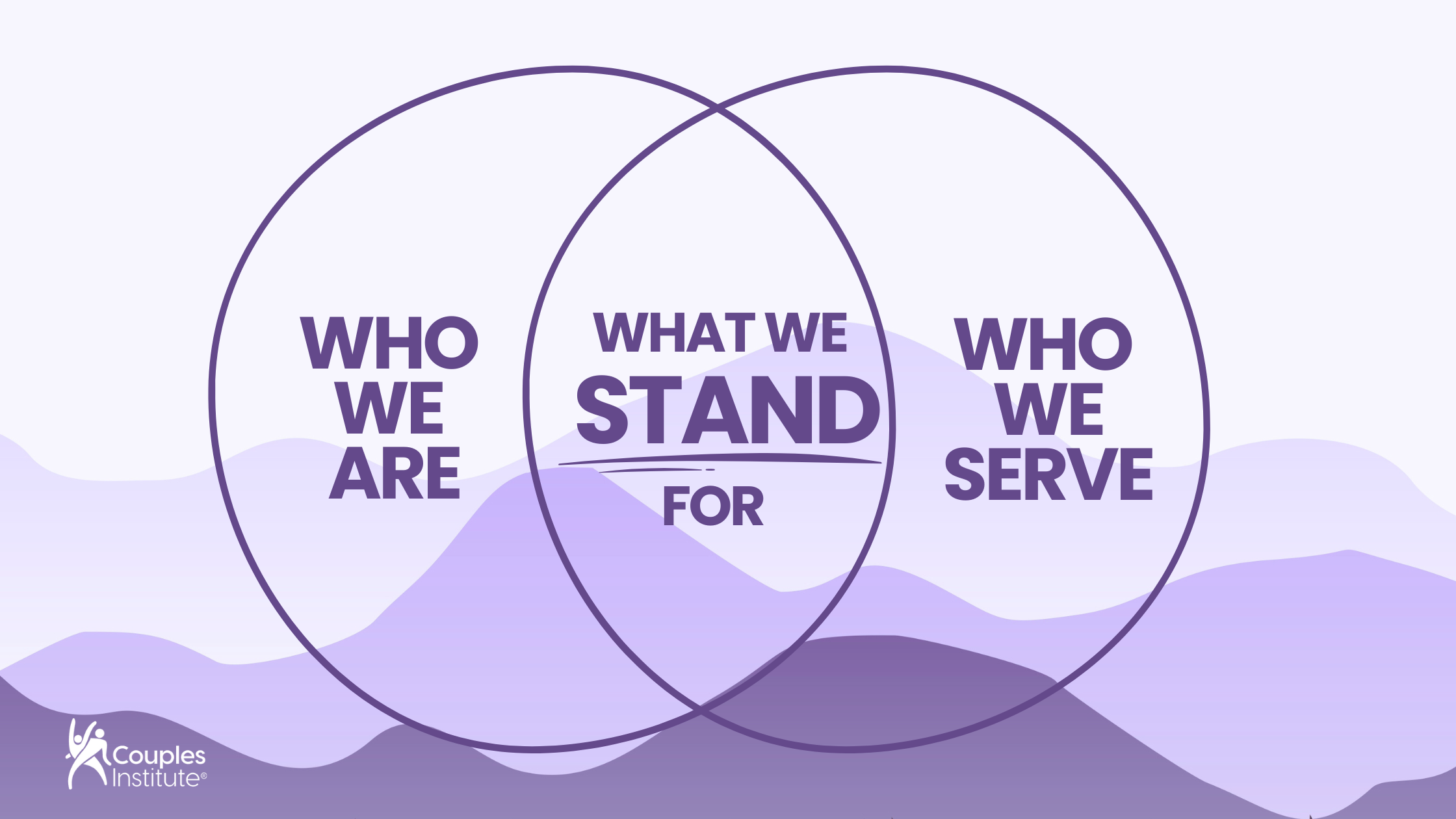
What We Stand For at The Couples Institute® If you read one thing from us this year, let this be it
As we look into the New Year, I want to share with you very clearly what Couples Institute stands for, now and always. Most of

In my previous blog, I started showing you the elegance of using Gestalt two-chair work to transform self-absorbed parts of your clients. With self-absorbed partners, it’s important to recognize that self-absorption is an intrapsychic problem and that you will want to focus intrapsychically in many sessions.
It’s also important to note that, during therapy, the spouse often takes the self-absorption personally and describes it as an interpersonal issue. “My partner doesn’t care about what matters to me!” It becomes crucial for you to be clear with the spouse that the struggle would be happening no matter who the self-absorbed partner was with.
We’ll return to Bob, the same self-absorbed client we were following in the last blog. It’s now several sessions later. Pete has been working with Bob and his wife together, intermixed with occasional individual sessions with Bob.
In this session Bob’s wife, Karen, begins by saying that she is seeing some progress. She says that Bob is taking more initiative and seems to be starting to enjoy doing some things for her. She likes the shifts she is seeing.
Not one to settle for just ‘some’ progress, Pete asks for another dialogue between the part of Bob that resists being more giving (Self-Absorbed Bob, abbreviated SA Bob in the transcript below) and the part that aspires to change (Aspiring Bob).
Pete: Things seem to be improving at home. Let’s hear from the part of you that has been resisting change. Let’s have him talk to the part of you who aspires to change.
SA Bob: You are wearing me down. I am starting to see a little wisdom in what you are saying.
Pete: Shift chairs and see what the part that aspires to change is going to say.
Aspiring Bob: I do want you to get more from life.
Bob sits with this a minute before moving to the other chair to go deeper.
SA Bob: Ok but I am not giving up easily. I don’t want you to gloat. Maybe I can pick my battles more carefully and give you a little leeway.
Pete: You mentioned in an earlier session that you felt bossed by aspiring Bob. Now you are afraid he will gloat.
SA Bob: Where does it stop when you make big changes? I don’t want you to get all the credit. How do I know you won’t bully me? If I take the weight of the world on my shoulders then I’ll lose sleep.
Pete: Switch chairs.
Aspiring Bob: You may lose some sleep. You have to risk discomfort to get to the other side. I won’t belittle you if you risk.
By now Bob is getting so comfortable with the exercise that he moves fluidly from one chair to the other.
SA Bob: I know I approach life like a contest that I need to win. The winning seems to override everything else. I haven’t really cared about the effect on Karen.
Aspiring Bob: You can’t just think of yourself. Winning like that doesn’t work. You will end up alone. Really alone. Is that what you really want?
There are no dramatic breakthroughs with very self-absorbed partners. Rapid change approaches do not shake up the elaborately constructed and well-entrenched structure of the self-absorbed partner. As with Bob, the progress is developmental and incremental.
He is inching along. His basic character is slowly evolving. He is moving away from being driven by greed. The aspiring Bob is slowly and more forcefully gaining traction. He is confronting himself in a stronger and blunter way. The greed of self-absorption is no longer his driving force.
The couples therapy is less draining and more collaborative. The pressure for change is coming from Bob rather than coming from his wife or from Pete.
Karen can see Bob responding more and more from a caring position.
A few weeks later, Karen summarized Bob’s evolution this way.
“He is more aware of the roles and responsibilities required to run the household. He is following through more often and taking the initiative. He treats me more respectfully. He owns up to his stuff.
He gets joy and pleasure from doing things for me like getting me coffee in the morning. Sometimes he cooks me breakfast. He opens the car door for me because he enjoys being a gentleman. He waits for the plumber to come and it’s not just a ‘I have to….’ No, it’s an, ‘I will do it.’ And he feels good about his participation.
He enjoys making my life easier like going to the post office. He enjoys taking the initiative and finds it personally rewarding. Perhaps best of all it’s not just his compliance to therapy or for me.”
Creating these posts on self-absorption has been challenging and rewarding for me. There were so many aspects of this work that I wanted to share with you, specifically, building empathy and collaboration in your couples, and increasing your own skill set in working at the intrapsychic level.
When I started putting this together I had no idea how long it would take and how intricate it would be to convey the real transformation that is indeed possible. I’ve been happy to learn that I hit a nerve with so many therapists and deeply appreciate the many emails and comments I’ve received.
You continue to push my thinking and hopefully I continue to push yours. Together we get better and better at doing this challenging work.
In my last email I mentioned that my online training and mentoring program opens soon, in two days. Click here to see the details and to learn about the Bonus Call Pete and I are conducting on “Mastering Your Work with Self-Absorbed Partners.” It takes place September 19th.
On the call you’ll learn a three-step formula for confronting self-absorbed partners, as well as learning how to facilitate more other-differentiation. We’ll also focus on how partners can coach each other to create more collaboration at home. You’ll be able to get your questions answered on working with self-absorbed partners. Your clients will stay longer. And, you’ll feel more secure about your ability to facilitate change.
Our world desperately needs more therapists who are willing to take on the challenge and skillfully work with couples in truly effective ways. I hope you feel called to be one of them. I would be honored to work with you.
If you missed the first three parts of this series on self-absorbed partners, you can click here for part one, part two and part three.
And – if you value this content and want more direct support, check out my online couples therapy training program.
"*" indicates required fields
 We respect your privacy.
We respect your privacy.
"*" indicates required fields
 We respect your privacy.
We respect your privacy.
As we look into the New Year, I want to share with you very clearly what Couples Institute stands for, now and always. Most of

My passion for educating couples early in their committed relationships was initially driven by personal experience. When I married at 22, my husband and I

When therapists ask me which tool has had the biggest impact on couples around the world, the answer is always the same: the Initiator–Inquirer (I-I)
Great work!
Not engaging in therapy now, but very much like Gestalt work.
Dear Ellyn It is always a pleasure to read your posts. I enjoyed being on the training and I still enjoy getting your blogs and insightful posts.
Hi Ellyn & Pete, thanks so much for these invaluable tools. One question, I have a client who refuses to see any reason to change her self-absorbed stance. She has a trauma background & is resistant to doing more work on that part of herself with me. Her stance is pretty consistently “He’s doing it to me” & “What if I make an effort & nothing gets better anyway?”
Do either of you have any suggestions? I believe I this client’s behaviour shows she isn’t engaged in the work, even though she says she is. She first came to see me for a few individual sessions in July 2009 & she’s been coming with her husband since December 2012. This is a couple I presented in Level 2. I’m feeling very stuck with them & change (if any) is indeed slow. I’d appreciate any hints. Thanks, Vivian Baruch, Australia.
Hi Vivian – the comment from your client “What if i make an effort and nothing gets better?”
Actually the question of “Why should I have to change?” is the heart of couples therapy for many many couples. The think it even if they don’t express it. And we therapists need a good response that goes beyond asking about what happens if they or their partner don’t change.
Ellyn and I role played with a therapist who had this dilemma how to deal with this vexing problem. You can listen to the replay at your convenience. it was the August 22nd 2014 call.
You will hear an intervention that is is simultaneously intrapsychic and systemic which gets the therapist out of the middle and sets the stage for working with each with a renewed energy.
Thank you again for your comments and your dedication to changing lives through couples therapy
Pete
Nice technique Ellyn.I Really love your blog and enjoy it too.Never miss any of it.This fact of intrapsychic change is very unique.
How relevant this topic is for my work with a new couple. Your approach is excellent and I thank you.
This information is very relevant to work I am currently doing. Excellent way to address this issue of the self-absorbed to disarm.
I wish my couple’s therapist had had this wisdom, maybe I wouldn’t have had to divorce my husband, who has gone on to have difficult relationships after me, and whose self-absorption can still cause problems for our children. I like that you don’t demonize these people, as they are not all bad. Usually a difficult childhood is behind this behavior. You also make me believe that if I attract a similar personality in the future, I won’t be doomed to the same outcome! Thank you for that. I still struggle to understand what happened in my marriage, and your blog really shed light on my past.
Your post came at the right time. Yes, we all have some self centre side of our character. I think we have all self absorbent in some ares in our lives. I am self absorbing for my own health and healng. My partner is focusing on different thing like being the one in charge and has power in decison making. In a sense, I can’t self I am the one less evil of two. We are accomplice. We are driving each other crazy and at the same time I believe we are deeply in love. Thanks for the insight! I need to learn how to save his face and disalarm the distanful feeling. As one saying is stated that we are the mirror of each other. If I don’t have whatever that thing in me, I won’t feel ashamed and embarrassed. I am learning to meet each other needs and languages. Thanks again! A good partnership is included version, character, courage, love, gratitude, compassion and vitality. Thanks for the blog again 😉
Running into your brief training and work has been incredible. Mostly because I’ve been trying to find a therapist with this specific skill to work with personally. My partner is self-absorbed and he scares therapist away. I am a therapist myself and still, Im finding many therapist do not feel comfortable with this client, which is so discouraging. I know we could do good work if we found a skilled therapist who truly understands how to work with the self absorbed. What should I be asking or looking for when identifying the right couples therapist? I wish I could clone you!
Thanks so much for putting this blog together and all the work you did Ellyn, I can see the benefits from this & have a SA client who might really benefit from this gestalt style of therapy.
@Oge Igboegbunam… Intrapsychic space helps to drown out the harsh inner critic via transcendence of enmeshment with a self-absorbed partner.